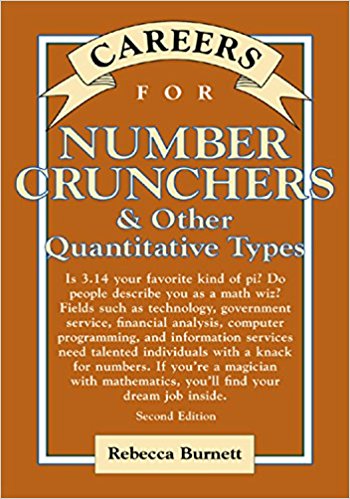

 |

|

The average rating for Careers for number crunchers & other quantitative types based on 2 reviews is 2 stars.
Review # 1 was written on 2012-04-10 00:00:00 Joe Arnold Joe ArnoldWell this was interesting and may prove to be helpful. There are a couple oddball pieces of advice here. One is that undergrad research experience is irrelevant for admission to grad school. I have pretty consistently heard exactly the opposite. The other, which I consider completely bonkers, is the advice not to study for the Math GRE. "A person intending to go to graduate school in mathematics certainly should score *at least* in the high 700's on the advanced mathematics subject area exam. ... If you have a solid background, and if you get a good night's rest before the exam, then you should do fine. ... I can see no reason to study for the Math GRE, and I do not encourage you to do so." Right... Well, since less than 20% of students who take the test make his high 700's minimum, perhaps the rest forgot about the good night's rest beforehand? It seems that his assumption is that students applying to grad school all have good backgrounds. And, yes, for students with strong undergrad backgrounds, the Math GRE is pretty basic. But there are plenty of students with weaker backgrounds who NEED to fill in some gaps in their knowledge. To be honest, probably the large majority of math majors, even ones with their eyes on grad school, have "weaker backgrounds." And, regardless of background, anyone who doesn't at least work the sample exams for such an important test is just crazy. I think this attitude may ultimately come from propaganda by testing companies ("Our test is magical and really tests innate ability, so it's impossible to study for it!") and seems to have been prominent a few decades ago. |
Review # 2 was written on 2014-08-04 00:00:00 Gary Hendershot Gary HendershotThis is the second guide from Krantz which I've read (the first was How to Teach Mathematics), and I must say that I was once again impressed. As a third year graduate student, experience under my belt has allowed me to already be aware of a third of the advice he delivered (e.g. passing prelims, choosing an advisor, graduate fellowships), but the counsel he provided for upcoming events was very useful. Overall, I was very motivated by his words of wisdom. I really liked his advice on speaking to an advisor about thesis topics, what to do when you cannot solve your thesis problem, and what to do when things do not go as planned. I really enjoyed reading advice on what happens after PhD graduation and the reality of the job market. Even though I have already discussed these topics with my own advisor and other students, it was good reading it as reinforcement and as a reminder. I do wish I read this book PRIOR to entering graduate school (like as a graduate-school-bound senior) because I would've felt more comfortable starting graduate school with a better idea of what I was getting myself into. I highly suggest graduate school prospects to take a look at the chapter "What I need to know for graduate school"--which provides a nice summary/list of topics in various fields of mathematics which show up in many first year courses and qualifying exams. |
CAN'T FIND WHAT YOU'RE LOOKING FOR? CLICK HERE!!!